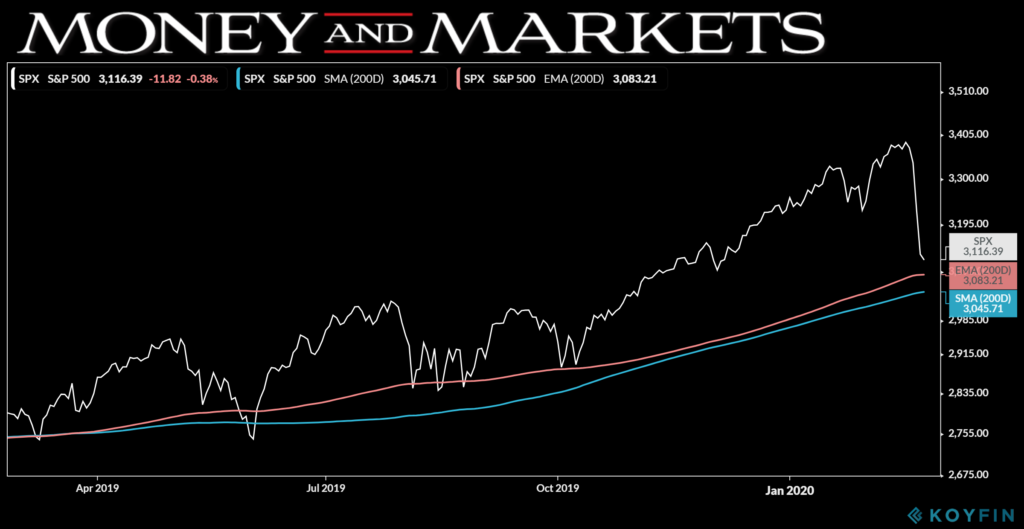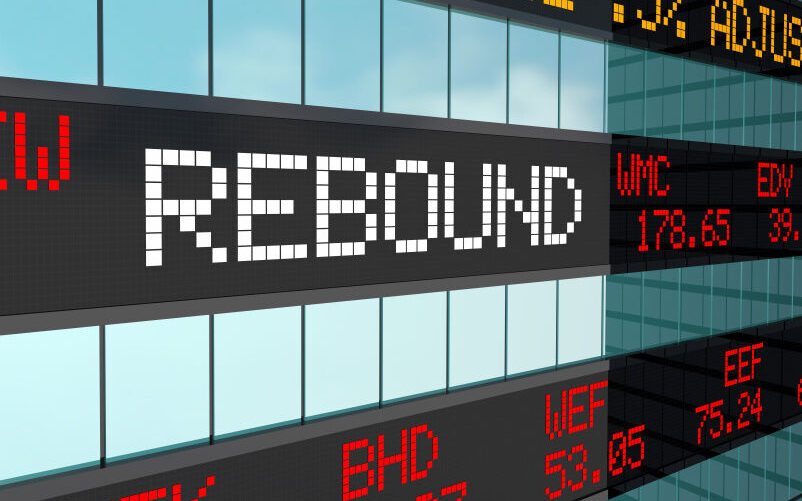If you think the last three days in the markets have been bad, it’s likely to get worse.
Uncertainty over the spread of the coronavirus has dropped markets increasingly lower. The Dow Jones Industrial Average dropped more than 2,000 points from Monday to Wednesday.
Presently, the S&P 500 is dangerously close to its 200-day simple moving average of 3,045, and if it closes below 3,047 from now until Monday, it will be the fastest 10% decline from an all-time high in the index’s history, according to Bespoke Investment Group.

If the S&P 500 closes below 3,047.53 today, tomorrow, or Monday, it will be the fastest 10% decline from an all-time high in the S&P 500’s history.
— Bespoke (@bespokeinvest) February 27, 2020
To reach the 200-day moving average, the S&P 500 would have to drop another 12%-15%. That would put it close to a 20% decline — bear market territory. It’s dropped by about 8% in the last five days.
The Nasdaq Composite has fallen about 8.5% over the same time.
The average correction for the S&P 500 lasts around four months, but analysts said this could be much later — even into July — so long as virus fears continue.
Additionally, it remains unclear what, if anything, the Federal Reserve can do to trigger a significant market rebound. It’s too soon for the Fed to consider a negative interest rate policy, and that would only be used as a last resort.
Market Rebound: Not Buying the Dip
Economists and analysts are cautioning investors from buying into the recent dip in share prices.
Allianz chief economic adviser Mohamed El-Erian recently said market conditions now are “much different” than previous dips.
“I would continue to resist, as hard as it is, to simply buy the dip,” El-Erian said.
Citigroup Inc. (NYSE: C) strategist Jeremy Hale told clients the same thing in a recent note.
“We are reluctant to buy the dip in risk assets just yet,” he said. “It will likely take further tightening in financial conditions to force the Fed’s hand into acting.
“We await signs of a policy response to pull the trigger.”
Top U.S. central bank officials have signaled repeatedly that they see no need to cut rates further anytime soon because they see the American economy performing well and it is too soon to judge the risk from coronavirus, also known as COVID-19.
The Earnings Issue
While economists like El-Erian earlier cautioned against buying the dip, one of the biggest reasons is corporate earnings.
On Thursday, Goldman Sachs Group Inc. (NYSE: GS) U.S. equities strategist David Kostin revised earnings estimate for 2020 down from $174 per share to $165. That constitutes a 0% growth in corporate earnings.
He said the earnings models have been revised to take into account the likelihood the coronavirus becomes more widespread.
“Our reduced profit forecasts reflect the severe decline in Chinese economic activity in 1Q, lower end-demand for US exporters, disruption to the supply chain for many US firms, a slowdown in US economic activity, and elevated business uncertainty,” Kostin said.
Microsoft Corp. (Nasdaq: MSFT) joined fellow tech giant Apple Inc. (Nasdaq: AAPL) in suggesting it won’t meet its next quarterly guidance because of the coronavirus. PayPal Holdings Inc. (Nasdaq: PYPL) also issued a warning this morning that the coronavirus could negatively impact its earnings.
That could press the time frame of a market rebound into later in the year.
What now?
Expect markets to continue a downward spiral until the coronavirus spread eases.
The biggest challenge is knowing when exactly that will be.
On Wednesday, the World Health Organization reported the number of daily coronavirus cases outside China has exceeded those inside the country.
Once there is subsidence, the challenge will be for markets to attempt a correction as quickly as possible.
But analysts suggest it may take longer for that rebound to take hold.





